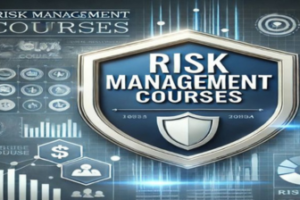
FRM Course: Know About the Eligibility, Career, & Scope
FRM Course: Know About the Eligibility, Career, & Scope
The modern financial sphere is diverse and constantly changing. It puts different types of risks upon institutions and their investors, including credit, market, operational, and others. Due to the growth of businesses in all parts of the globe, there is a high demand for risk professionals. The FRM (Financial Risk Manager) course is one of the most revered in the risk management field, being under the management of the Global Association of Risk Professionals (GARP).
World-renowned, the FRM course equips people with skills to deal with risk effectively in the changing financial world. This article discusses the eligibility requirements, career opportunities, and future of the FRM course. We will also speak about the work of the Global Risk Management Institute (GRMI) in the development of the learning ecosystem to become a professional in the field of risks.
FRM Course Details
The Financial Risk Manager (FRM) qualification is a professional title awarded to people engaged in risk management. The certification has two components: FRM Part I and FRM Part II. Passing both exams, together with two years of experience working in risk management or similar disciplines, enables one to graduate and become an FRM.
Important Topics:
- Quantitative Analysis
- Financial Markets and Products
- Valuation and Risk Models
- Credit Risk
- Market Risk
- Operational and Integrated Risk Management
- Current Problems in Financial Markets
Professionals who are certified FRM holders are in demand all over the world. The most valuable positions in banks, investment firms, insurance companies, and credit agencies, as well as government regulatory organizations, are often offered to FRM-certified professionals.
Eligibility Criteria
Among the benefits of the FRM course is the absence of strict academic requirements. Any person, without any precondition of academic background or experience, can take up any qualification exam offered by the FRM. Nevertheless, it is strongly advised that candidates possess:
- A master’s degree in finance, economics, mathematics, or related fields.
- Some knowledge of quantitative terms and financial markets.
Requirement of Work Experience:
To obtain the FRM credential, applicants must document two years of work experience. This may involve roles in risk management, trading, portfolio management, auditing, or any other role where risk analysis is a major part.
Exam Format:
- FRM Part I: It concentrates on the instruments used to measure financial risk. It is a multiple-choice test conducted during the months of May, August, and November.
- FRM Part II: It focuses on applying the learned tools from Part I. The questions are based on real-life scenarios. It is held in May and December.
Note: The exams must be passed within four years. The work experience should also be submitted within five years after passing Part II.
Career Opportunities
The FRM certification opens access to a variety of positions in the financial industry. It is used as a reporting tool by hiring managers targeting risk specialists. The following are some of the most important job positions often offered to FRM-certified professionals:
- Risk Analyst
- Credit Risk Manager
- Regulatory Risk Consultant
- Operational Risk Manager
- Quantitative Analyst
- Portfolio Risk Manager
- Chief Risk Officer (CRO)
Best Companies Employing FRM Holders:
- J.P. Morgan
- HSBC
- Goldman Sachs
- Citibank
- Deloitte
- KPMG
- PwC
- Morgan Stanley
Scope of FRM
The regulatory environment is becoming increasingly stricter. New financial instruments continue to evolve, which means the need for risk management has never been higher. The duties of risk managers became even more important after the 2008 global financial crisis and during the COVID-19 pandemic. Institutions have realized that active management of financial risk is key to long-term sustainability.
FRM is not limited to the field of banking alone. It cuts across various sectors such as:
- Insurance
- Asset Management
- Fintech
- Corporate Finance
- Regulatory Bodies and Government Agencies
Focus on Global Risk Management Institute (GRMI)
The Global Risk Management Institute (GRMI) is one of the best institutes in India providing education in risk management aligned with industry requirements. GRMI is famous for its Post Graduate Programme in Risk Management (PGP-RM), which combines global best practices and real-life case studies.
Key features of GRMI include:
- The design is developed in collaboration with industry experts.
- It provides end-to-end risk models including cyber risk, enterprise risk, and forensic risk.
- It offers excellent placement support and strong industry interaction.
- It equips students with both theoretical and practical tools.
The GRMI curriculum neatly supplements international certification programs such as FRM. It provides a solid foundation for any risk professional. GRMI graduates are well-positioned within top consultancies, banks, and businesses.
Conclusion
FRM certification is a valuable asset for candidates who wish to establish a career in risk management. As the world becomes increasingly aware of financial risk and compliance, the value of certified professionals grows significantly. Whether you are a student aiming for a career in finance or a working professional seeking specialization, FRM is an excellent career decision.
With institutions like GRMI offering complementary learning and industry exposure, pursuing risk management education can be a transformative step towards career success.
You may also like

How to Decide Whether You Need a Post Graduate Degree

Best Risk Management Courses in India for Finance Students


